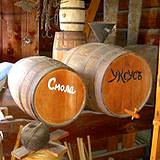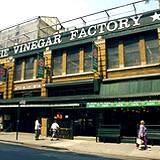|
Vinegar Has Been Around
|
 |  |  |
Share Your Vinegar Tip or Read What other Visitors Wrote
Like most products, the discovery of vinegar was purely by accident. Today there are so many uses and varieties, not only for kitchen recipes, but also cleaning, pest control, medicinal use and pet care.
HistoryThe earliest record of vinegar use dates back almost 7,000 years ago to ancient Babylonia when dates were made into wine and vinegar. It was used as a medicinal as well as a flavoring for a number of dishes. Other fruites became popular around the same period and these included grapes and figs. Laborers in ancient times were given small amounts of wine vinegar and water with a dash of salt to pep them up and work more hours. The Roman army was given vinegar rations to give them more stamina. In World War I vinegar was used to treat wounds. Vinegar does have certain antibacterial and antiseptic properties.
The Difference in Vinegars Vinegar is commonly produced from ethyl alcohol utilizing the bacteria, acetobacter, which feed on the alcohol, converting it into acetic acid (vinegar). Vinegar, however, can be made from a number of other foods, which is the preferred variety to use such as, apples or grains. The distilled vinegars are best used for cleaning purposes and not as a food additive. Vinegar tends to stimulate the taste buds and make them more receptive to other flavors.
The varieties of vinegar are endless, depending on the food that is used to produce it. It is a mild acid called "acedtic acid."
Common Types of Vinegar
- Apple Cider Vinegar
- Plain White Distilled Vinegar and some trivia!
- Herbal Vinegar Recipes & Benefits
- Red and White Wine Vinegars
- Barley
- Malt
- Rice
- Balsamic and special recipes!
Vinegar will have a shelf life and retain its effectiveness for about 18 month. Substitute Apple Cider Vinegar in recipes when possible since it is healthier. Apple Cider Vinegar contains malic acid, which is actually friendly to human digestive process.
Going Green with Vinegar
Grandma's Favorite Uses
Who would think in today's modern world people would be going back to one of the oldest ingredients you can find on store shelves? People are quickly learning that all those shelves selling cleaning supplies, garden chemicals, pet care and medicinal supplies should be avoided like the plague.
Research is finding many of the labels we grew accustomed to seeing on our kitchen shelves, under our sinks, in our garages and gardens are what is making not only our environment sick, it's making us sick too.
The movement is happening today, people are going green and getting some vinegar wisdom might seem like a small thing to learn but small tidbits of information is exactly what will make this happen for a healthier world to live in.
Here are some of Grandma's favorite uses for vinegar
- In the Garage
- Around the House Cleaning with White Distilled Vinegar
- Grandma's Tips and Recipe for Making Apple Cider Vinegar
- For the Cook
- In the Medicine Cabinet Health Benefits of Apple Cider Vinegar
- Here are some more weird but amazing Benefits of Vinegar Tips.
- In the Bathroom
- Rice Vinegar has some amazing Health Benefits used by Japanese people for thousands of years!
- In the Laundry and Stains
- For Pets
- In the Garden
- In the Outdoors
- For Do It Your Self Tips
- For Science Experiments
- Odds and Ends
- Will Vinegar Treat Toenail Fungus?
Take your time, browse around and get some great ideas and tips. If you have any tips of your own please don't hesitate to contact Grandma and share your wisdom.
A Bit of Vinegar Trivia!
Vinegar was probably discovered when the first cask of wine turned sour. The French origin of the word 'vinegar' is 'vinagre', which means, literally, sour wine.
Cleopatra dissolved some pearls in vinegar to prove she could consume a fortune in a single meal.
Mother of Vinegar is the stringy, slimy substance composed of yeast cells and various bacteria that forms on the surface of fermenting liquids, turning it into vinegar. It is removed once the process is completed. After opening a bottle of vinegar, you may notice mother beginning to form. It is not harmful or spoiled. Filter it out and use it to make your own vinegar from wine or cider.
DISCLAIMER:
The statements made here have not been approved by the Food and Drug Administration. These statements are not intended to diagnose, treat or cure or prevent any disease. This notice is required by the Federal Food, Drug and Cosmetic Act.





